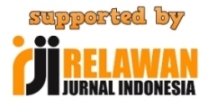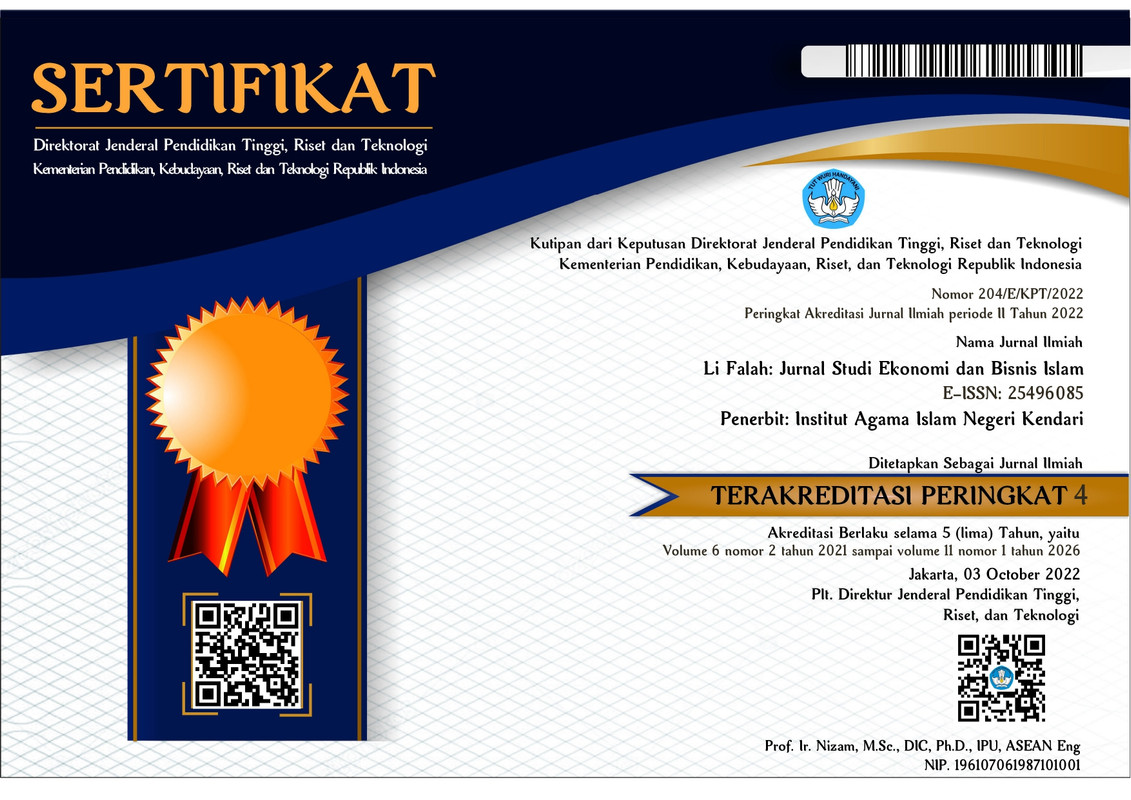How Competency Shaped: Implications for Practice With Indonesian Muslims Employee
Abstract
Keywords
Full Text:
PDFReferences
Amstrong, & Baron. (1998). Performance Management Hand Book. IPM.
Azhari, N. N. A. B., Mohd, R. B., Hafit, I. A. B., Mohamed, R. N., & Hashim, M. Z. B. (2021). Does Religiosity Matter in Personal Knowledge Management and Job Performance ? A Case of Employees in Public Sector in Malaysia. Global Business and Management Research: An International Journal, 13(4).
Berliana, V., & Arsanti, T. A. (2018). Analisis Pengaruh Self-efficacy, Kapabilitas, dan Perilaku Kerja Inovatif terhadap Kinerja. Jurnal Maksipreneur: Manajemen, Koperasi, Dan Entrepreneurship, 7(2), 149. https://doi.org/10.30588/jmp.v7i2.364
Chouchan, V. S., & Srivastava, S. (2014). Understanding Competencies and Competency Modeling - A Literature Survey. IOSR Journal of Business and Management, 16(1), 14–22. https://doi.org/10.9790/487x-16111422
Faisal, R. (2020). Analysis of competency to employee motivation and the impact to employee satisfaction (study cases at beauty services company). Journal of Research in Business, Economics, and Education, 2(5), 1276–1285.
Hejase, H. J., Hamdar, B. C., Hejase, A. J., & Beyruti, N. (2014). Knowledge Sharing : Assessment of Factors Affecting Employee' Motivation and Behavior in the Lebanese Organizations. Journal of Scientific Research & Reports, 3(12). https://doi.org/10.9734/JSRR/2014/8107
Hutapea, P., & Thoha, N. (2004). Kompetensi Plus: Teori, Desain, Kasus dan Penerapan untuk HR dan Organisasi yang Dinamis. Gramedia Pustaka Utama.
Juliana, R., Hasan, K., Kasman, A., & Agustina, M. (2022). The Building a Religious Work Culture in Improving Employee Performance Quality. Jurnal Iqra, 7(2), 133–141.
Kardinasari, R. (2012). Kompetensi Kerja Pegawai Negeri Sipil Dinas Pendapatan Daerah Provinsi Jawa Barat. Jurnal Kebijakan Dan Manajemen PNS, 6(2).
Maharani, L. (2018). Pengaruh Faktor-Faktor Kompetensi Terhadap Kinerja Karyawan Jasa Konsultansi Konstruksi Di Pekanbaru. Jurnal Niara, 11(2), 125–134. https://doi.org/10.31849/nia.v11i2.2133
Male, S. A., Bush, M. B., & Chapman, E. S. (2011). An Australian Study of Generic Competencies Required By Engineers. European Journal of Engineering Education, May. https://doi.org/10.1080/03043797.2011.569703
McClelland, D. C. (1973). Testing for Competence Rather Than for Intelligence. American Psychologist, 28(1), 1–14.
Puteh, F., Kaliannan, M., & Alam, N. (2016). Employee Core Competencies and Organizational Excellence: An Interpretative Analysis. Australian Journal of Business and Economic Studies, 2(1), 45–55.
Qomariyah, E. (2021). Model Sistem Kepegawaian Daerah Berdasarkan Pendekatan Systems Thinking. CV. Literasi Indonesia.
Ramlee, N., Osman, A., Nizam, S., & Kit, S. (2016). The Influence of Religiosity, Stress and Job Attitude towards Organizational Behavior : Evidence from Public Universities in. Procedia Economics and Finance, 35(16), 563–573. https://doi.org/10.1016/S2212-5671(16)00069-1
Safitri, D. (2013). Berbagi Pengetahuan Sebagai Alternatif Penciptaan Pengetahuan Untuk Staf Pengajar Vokasi Ui. Jurnal Vokasi Indonesia, 1(2). https://doi.org/10.7454/jvi.v1i2.15
Saleh, C., Islamy, I., Zauhar, S., & Supriyono, B. (2013). Pengembangan Kompetensi Sumber Daya Aparatur. UB Press.
Salman, M., Ganie, S. A., & Saleem, I. (2020). The concept of competence: a thematic review and discussion. European Journal of Training and Development, 44(6–7), 717–742. https://doi.org/10.1108/EJTD-10-2019-0171
Singh, S. P., & Pinki. (2009). New Skills for LIS Professionals in Technology-Intensive Environment. ICAL. https://citeseerx.ist.psu.edu/viewdoc/download?doi=10.1.1.458.3115&rep=rep1&type=pdf
Spencer, L. M., & Spencer, S. M. (1993). Competence at Work: Models for Superior Performance. Library of Congress Cataloging-in-Publication Data.
Sudirlan, I., Maarif, M. S., Affandi, J., & Arkeman, Y. (2019). Peningkatan Kapabilitas Karyawan dan Penerapan Budaya Baru Perusahaan dalam Mewujudkan Daya Saing. JKBM (Jurnal Konsep Bisnis dan Manajemen), 5(2), 240-257.
Thepho, C., & Luengalongkot, P. (2020). Competency Factors Affecting Work Efficiency of Task-based Employees in Local Administration Organizations. 57, 62–69.
Vos, A. De, Hauw, S. De, & Willemse, I. (2011). Competency Development in Organizations: Building an Integrative Model Through a Qualitative Study. In Vlerick Leuven Gent. University Leuven.
Wibisono, C., & Putri, A. S. (2018). Competence Determination, Work Environment, and Effectiveness on Employee Performance Through Working Satisfaction of Stie Pembangunan Tanjungpinang. Jurnal Managerial Dan Bisnis Tanjungpinang, 2(01), 1–23.
Wijayanto, A., Hubeis, H. M., Affandi, M. J., & Hermawan, A. (2011). Faktor-faktor yang Mempengaruhi Kompetensi Kerja Karyawan. Manajemen IKM, 6(2), 81–87.
Wong, S.-C. (2020). Competency Definitions, Development and Assessment: A Brief Review. International Journal of Academic Research in Progressive Education and Development, 9(3), 95–114. https://doi.org/10.6007/ijarped/v9-i3/8223
Zahari, I. Bin, & Obaid, T. F. (2014). The Role of Key Factors of Training Transfer on Employee's Job Performance : A Review. European Scientific Journal, 2(June), 163–169.
DOI: http://dx.doi.org/10.31332/lifalah.v7i1.2464
Copyright (c) 2022 Zulkifli

This work is licensed under a Creative Commons Attribution-ShareAlike 4.0 International License.
Li Falah : Jurnal Studi Ekonomi dan Bisnis Islam, Indexed In
Accredited By
View My Stats
Organized by : Fakultas Ekonomi dan Bisnis Islam
Published by : Institut Agama Islam Negeri Kendari
Jl. Sultan Qaimuddin No. 17 Baruga Kota Kendari Provinsi Sulawesi Tenggara
phone. +62401-3193710
Fax. +62401-3193710
Email: [email protected]



















